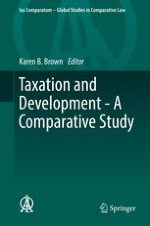2017 | OriginalPaper | Buchkapitel
9. Current Issues in Cross Border Taxation and Investment in the State of Israel
verfasst von : Tamir Shanan, Sagit Leviner, Moran Harari
Erschienen in: Taxation and Development - A Comparative Study
Aktivieren Sie unsere intelligente Suche, um passende Fachinhalte oder Patente zu finden.
Wählen Sie Textabschnitte aus um mit Künstlicher Intelligenz passenden Patente zu finden. powered by
Markieren Sie Textabschnitte, um KI-gestützt weitere passende Inhalte zu finden. powered by
